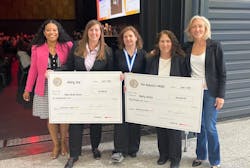Promoting diversity in STEM: How inclusion strengthens manufacturers and robotics
The U.S. STEM workforce gradually diversified between 2011 and 2021, with increased representation of women and underrepresented minorities, including Latinx, African-American and Native American people, according to Diversity and STEM 2023, a report published by the National Science Foundation’s National Center for Science and Engineering Statistics.
In 2021, among people ages 18 to 74 years, women made up half (51%) of the total U.S. population, but only about a third (35%) of people employed in STEM occupations were female, according to the report. In that same year, nearly a quarter (24%) of individuals in the U.S. workforce were employed in STEM occupations.
Latinx workers represented 15% of the total STEM workforce in 2021, and Asian and African-American workers were 10% and 9%, respectively. Native Americans, including Alaskan Natives, made up less than 1% of the U.S. population and STEM workforce in 2021. Nearly two-thirds (65%) of women working in STEM jobs in 2021 had at least a bachelor’s degree education, compared with less than half (43%) of men in STEM jobs, according to the report.
Think globally, act locally
In the Massachusetts technology sector, for example, which includes STEM and the robotics industry, only 5% of workers are African-American, 7% are Latinx, and one-third are women, according to the Massachusetts Technology Leadership Council (MassTLC). That’s why the MassRobotics Jumpstart Fellowship Program was established. Created in 2021 and expanding to a second location at the University of Massachusetts Lowell this year, the program gives underrepresented Massachusetts high-school girls a foundation in technical skills, as well as mentors and a professional network that provides support and confidence along with direct engagement with industry professionals. All female high-school juniors and seniors, especially those who are African-American and Latinx, with a passion for robotics and technology are encouraged to apply.
The program is held on Saturdays from January through May, and includes a full week of sessions and field trips to robotics companies February 19-23, which is Massachusetts’ public-school vacation week. Next, students gain real-world experience through paid internships at a robotics or technology company.
A key part of the Jumpstart program is making sure these young women feel confident and empowered to enter STEM fields. Students learn directly from mentors about the different types of robotics jobs and how to leverage their studies into a career in robotics through lab and company visits.
Students will once again experience technology sessions at the UMass Lowell NERVE Center, which develops test methods and metrics for measuring robot capabilities, human performance and human-robot interaction.
“UMass Lowell has worked closely with MassRobotics for years and I have seen firsthand how programs like Jumpstart can fundamentally alter students’ career trajectories,” said Julie Chen, a mechanical engineer who led UMass Lowell’s research enterprise before becoming the university’s chancellor in 2022. “Connecting students with mentors they can connect with creates a self-reinforcing cycle. The best way to create the strongest technology sector in Massachusetts is by ensuring it is welcoming to all.”
Massachusetts Technology Collaborative, a supporter since the pilot program launched in 2021, will continue to support programming, as well as the expansion to UMass Lowell.
“We have seen this program help diversify and grow the talent pipeline for robotics and tech across Massachusetts,” said Carolyn Kirk, executive director, Massachusetts Technology Collaborative. “Our continued dedication to uplifting a new generation of young women will not only help provide them with the experience and training they need to excel, but it will help strengthen our competitiveness as a state. It’s important that we continue to support programs like Jumpstart that provide opportunities and resources to build upon the progress we have made and ensure that more young women gain experience in critical, emerging sectors."
"GreenSight co-founded Jumpstart because supporting STEM education and helping foster diversity, equity and inclusion (DEI) in the tech industry are core goals of our company,” said Joel Pedlikin, co-founder and COO at GreenSight. “Jumpstart allows us to make a noticeable difference in both these areas. To us, the lack of diversity in robotics is an obvious sign that a lot of high-quality talent simply is not able to break into the industry. Jumpstart is a small but significant way for GreenSight to enlarge the pool of U.S. robotics engineers. Years of experience has taught our company how to make excellent use of engineering co-ops and interns, and the Jumpstart interns we’ve hired have made significant contributions to GreenSight."
Recognizing excellence
MassRobotics will be awarding and celebrating its inaugural Robotics Medal and Rising Star recipients at a formal gala being held in Boston at the Museum of Science on October 21. The Museum of Science will highlight the medal winners in their ongoing Women in Technology initiative. Tickets and reserved tables for the event are available by contacting [email protected].
The two winners, Nancy Amato and Alyssa Nicole Pierson, were announced at the IEEE International Conference on Robotics and Automation (ICRA) in London on June 1. The Robotics Medal recognizes the wide-ranging impact of female researchers focusing on the development of robotics around the globe. The Robotics Medal is awarded to a woman-identifying student/faculty nominated professor in robotics to recognize impactful contributions to the field and includes a $50,000 prize awarded to the individual. The Rising Star Award recognizes up-and-coming woman-identifying persons making strides and advancing the field of robotics and includes a $5,000 award given to the individual.
This inaugural MassRobotics Robotics Medal award, sponsored by Amazon Robotics, was presented to Amato at University of Illinois at Urbana-Champaign for her significant contributions to the field of robotics, notably for her research on the algorithmic foundations of motion planning, computational biology, computational geometry and parallel computing.
Pierson, at Boston University, was awarded the MassRobotics Rising Star in Robotics Medal for her key contributions to the cooperative, distributed control of multi-agent teams.
To encourage diversity in the field of robotics, Amazon established an endowment with MassRobotics in 2022 to support these two annual awards. The purpose of the Robotics Medal is not only to celebrate individual achievements, but also to inspire and encourage women and other underrepresented groups to participate in shaping the future of the world through robotics.
“By endowing the Robotics Medal, we aspire to showcase and celebrate women robotics professors worldwide who have made a significant impact to the advancement of the field of robotics,” said Tye Brady, chief technologist at Amazon Robotics. “It is an honor to be the founding sponsor of the Robotics Medal, and we are thankful for the significant contributions and teachings made by our rising stars and legendary pioneers in that field.”
A call for nominations began at last year’s ICRA, with nominations coming from all around the United States including Texas, Washington, Massachusetts, Illinois, Minnesota, New York and Pennsylvania, as well as around the globe from countries including Canada, Japan, Germany, Spain, Netherlands, Switzerland and India. Submissions spanned a wide range of robotic technology fields and areas of research, from new materials for gripping, exoskeletons and assistive technologies to human robot interaction and motion planning.
Since 2017, MassRobotics has grown from a Massachusetts-based incubator to a global robotics hub, helping support the adoption of robotics worldwide and providing startups with the resources needed to grow and scale. Of the current 80 startups that MassRoboitcs houses at its facility in Boston, more than 50% are from out of state and 25% are from outside the United States. MassRobotics hosts STEM and robotics related initiatives specifically targeted for high-school women and continues to promote women in robotics through events and networking to ensure women are recognized and heard.
“We were thrilled by the overwhelming number of qualified nominations we received and impressed with the diversity of robotic fields and research happening across the globe” said Joyce Sidopoulos, cofounder at MassRobotics. “It reflects the powerful contributions women have made and will continue to make to this important, vibrant and growing field supporting nearly all industries.”
The Robotics Medal and Rising Star recipients were selected by a committee of robotics experts, led by MassRobotics, which convened several times and methodically evaluated the significance, depth and originality of technical contributions each nominee has made in the overall field of robotics.
“The field of robotics requires the unique insights, inventiveness and leadership of more female professionals to propel the science, engineering and applications of this crucial discipline forward, and to inspire the ensuing wave of innovators,” says Daniela Rus, director of the Computer Science and Artificial Intelligence Laboratory (CSAIL) at Massachusetts Institute of Technology (MIT) and member of the MassRobotics board. Rus is a 2017 recipient of the Engelberger Robotics Award, as well. “The Robotics Medal signifies far more than its substantial monetary award. It symbolizes an acknowledgement and celebration of the remarkable achievements of women who not only pioneer in the field, but also inspire as role models, sparking the curiosity and ambition of the forthcoming generation of roboticists.”






